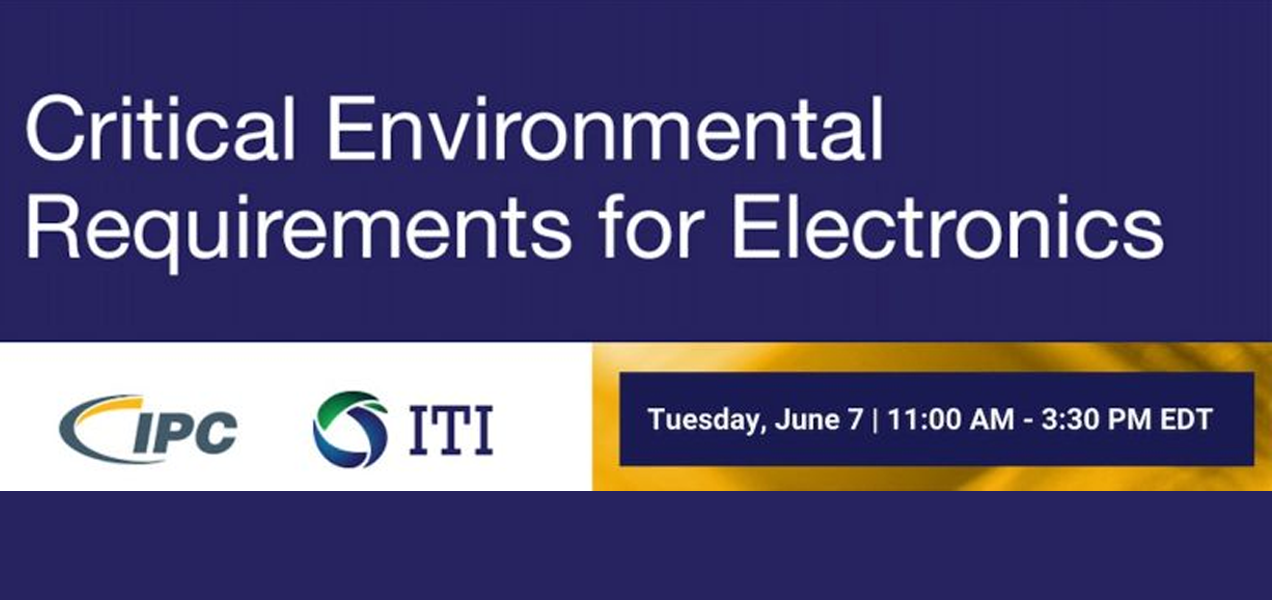 |
Dear IPC Members:
Electronics are at the heart of the modern economy, and yet the U.S. Government has neglected electronics manufacturing for decades.
That’s why I’m pleased to report that policy makers in the United States this week took their most significant step in years with the introduction of legislation to bolster the overlooked printed circuit board (PCB) sector. |
With critical legislation like this in motion, now is a good time, if you haven't already, to get involved with IPC advocacy. Stay tuned to our Advocacy Center next week for a fresh opportunity to join our “Call to Action” urging Members of Congress to cosponsor the PCB bill.
Please enjoy this week’s five-minute snapshot of the top issues we’re working on for you all over the world, and let us know if you have questions or suggestions.
All the best,
Chris Mitchell
Vice President, Global Government Relations
The Headlines at a Glance:
TOP NEWS OF THE WEEK
- New Proposal in Congress to Boost U.S. PCB Sector
QUOTE OF THE WEEK
- IPC’s John Mitchell Praises Introduction of PCB Legislation in U.S. Congress
IPC ADVOCACY AND YOU
- Tell Congress: A Robust U.S. Electronics Industry is in the National Interest!
ENVIRONMENT AND HEALTH
- Consultation Opens on the General Review of the RoHS Directive
- EPA Reopens Comment Period on 20 Toxic Substances
- Commission Opens Consultation on a New Regulation for Sustainable Products
- Japan Updates Priority Assessment Chemical Substances List
- China Begins Consultation on Adding New Substances to Chemical Inventory
TRADE AND SUPPLY CHAIN
- EU-U.S. Tech Council to Develop Warning System for Supply Chain Disruptions
- IPC Plays Key Role in NIST Workshop on Semiconductor Metrology R&D
HELP US SPREAD THE WORD ON SOCIAL MEDIA
KEEP IN TOUCH WITH US
TOP NEWS OF THE WEEK
New Proposal in Congress to Boost U.S. PCB Sector: The electronics manufacturing industry is welcoming a new, bipartisan proposal in the U.S. Congress that would help bring back the U.S. printed circuit board (PCB) sector. The Supporting American Printed Circuit Boards Act of 2022, introduced Friday by Reps. Anna Eshoo (D-CA) and Blake Moore (R-UT), would incentivize purchases of domestically produced PCBs as well as investments in factories, equipment, workforce training, and research and development (R&D). Let us know if you have any questions, and get ready to ask your Members of Congress to cosponsor the bill. IPC Contact: Chris Mitchell.
QUOTE OF THE WEEK
 |
“This bipartisan bill addresses vulnerabilities in a key segment of the electronics manufacturing value chain, taking a ‘silicon-to-systems’ approach that prioritizes innovation, resiliency, and innovation across the electronics industry. We thank Reps. Eshoo and Moore for their leadership in helping to rebuild U.S. electronics
– IPC President and CEO John Mitchell praises new legislation that would reinvigorate the U.S. PCB industry.
|
IPC ADVOCACY AND YOU
Tell Congress: A Robust U.S. Electronics Industry is in the National Interest: Encouraging the U.S. government to take a holistic approach to rebuilding its domestic electronics manufacturing ecosystem is the central theme of IPC’s IMPACT Washington Advocacy Campaign. If you agree, please visit the IPC Online Advocacy Center now to tell your Members of Congress to help secure federal support for the entire electronics supply chain. It only takes a minute and has a real impact! IPC Contact: Ken Schramko.
ENVIRONMENT & HEALTH
 |
Consultation Opens on General Review of RoHS Directive: The European Commission has opened a public consultation on the general review of the Restriction of Hazardous Substances (RoHS) Directive, including evaluation of the criteria and timelines for exemptions. The RoHS Directive, which aims to protect human health and the environment and maximize recovery of certain hazardous substances after their use, is one of the most important policies shaping electronics manufacturing. The deadline for comment is June 2. IPC will coordinate a response to this questionnaire, and we invite your engagement with us. IPC Contact: Kelly Scanlon.
EPA Reopens Comment Period on 20 Toxic Substances: The U.S. Environmental Protection Agency (EPA) has reopened the dockets for the 20 high-priority substances to undergo risk evaluation under the Toxic Substances Control Act (TSCA). This provides an additional opportunity for the electronics manufacturing industry to submit information that would help inform the risk evaluation processes for these chemicals, some of which have relevance to electronics manufacturing processes and products. The dockets are open until June 9. Please let us know if you are interested in this opportunity to inform future policy decisions. IPC Contact: Kelly Scanlon.
Commission Opens Consultation on New Regulation for Sustainable Products: The European Commission has opened a public consultation on a regulation that would repeal the existing Ecodesign Directive and establish a new framework for setting ecodesign requirements for sustainable products. The proposed regulation notably includes requirements for identifying substances of concern across a product life cycle and information requirements, including a digital product passport. The consultation is open through June 15. IPC welcomes your feedback on the proposed regulation. IPC Contact: Kelly Scanlon.
Japan Updates Priority Assessment Chemical Substances List: On April 1, Japan’s Ministry of Economy, Trade, and Industry (METI) designated four new substances as Priority Assessment Chemical Substances (PACs) under its Chemical Substance Control Law (CSCL). Fourteen chemicals were also removed from the list in a corresponding move. All manufacturers and importers of PACs are required to submit annual reports and additional hazard data. Let us know if you are affected by this update. IPC Contact: Kelly Scanlon.
China Begins Consultation on Adding New Substances to Chemical Inventory: On April 28, China’s Ministry of Ecology and Environment (MEE) began a consultation on adding 22 new substances into its Inventory of Existing Chemicals Substances in China (IECSC), and electronic manufacturers will want to take note. As a reminder, if the substance is not listed in the IECSC, your business must complete new substance registration before manufacturing or importing said chemicals. Chemicals that are not included in the IECSC are considered new chemicals and are managed under MEE Order 12. The consultation ends May 13. IPC Contact: Kelly Scanlon.
EPA Reopens Comment Period on 20 Toxic Substances: The U.S. Environmental Protection Agency (EPA) has reopened the dockets for the 20 high-priority substances to undergo risk evaluation under the Toxic Substances Control Act (TSCA). This provides an additional opportunity for the electronics manufacturing industry to submit information that would help inform the risk evaluation processes for these chemicals, some of which have relevance to electronics manufacturing processes and products. The dockets are open until June 9. Please let us know if you are interested in this opportunity to inform future policy decisions. IPC Contact: Kelly Scanlon.
Commission Opens Consultation on New Regulation for Sustainable Products: The European Commission has opened a public consultation on a regulation that would repeal the existing Ecodesign Directive and establish a new framework for setting ecodesign requirements for sustainable products. The proposed regulation notably includes requirements for identifying substances of concern across a product life cycle and information requirements, including a digital product passport. The consultation is open through June 15. IPC welcomes your feedback on the proposed regulation. IPC Contact: Kelly Scanlon.
TRADE AND SUPPLY CHAIN
EU-U.S. Tech Council to Develop Warning System for Supply Chain Disruptions: The United States and the European Union will develop an early warning system for semiconductor supply chain disruptions, according to draft documents to be adopted at the second meeting of the EU-U.S. Trade and Technology Council (TTC), coming up May 15-16 in France. The alert mechanism will aim to coordinate and exchange information at an early stage on issues that could evolve into significant trade barriers for EU and U.S. companies. Legislation is also being considered that would provide subsidies for domestic semiconductor production, Politico reports. IPC welcomes efforts to rekindle the U.S-EU partnership and will continue to advocate for transatlantic cooperation on bolstering the entire electronics manufacturing ecosystem. IPC Contact: Alison James.
IPC Plays Key Role in NIST Workshop on Semiconductor Metrology R&D: On April 20 and 21, the U.S. National Institute of Standards and Technology (NIST) hosted the second workshop in a series of virtual events focused on semiconductor metrology research and development (R&D), and IPC and the entire electronics manufacturing industry were well-represented. The plenary speaker at the workshop, Jan Vardaman of TechSearch International, was the co-author of a recent IPC report on advanced packaging, while IPC Chief Technology Officer Matt Kelly also assembled and moderated a panel on supply chain areas critical for the future of advanced packaging. Read more in a new IPC blog. IPC Contact: Ken Schramko.
HELP US SPREAD THE WORD ON SOCIAL MEDIA
 |
|
 |
Want to stay ahead of global issues and environmental policy trends that are impacting electronics manufacturers? Want to expand your network and connect with peers, customers, and suppliers in the electronics manufacturing industry? Join IPC and Information Technology Industry Council (ITI) for the virtual 2022 Critical Environmental Requirements for Electronics Conference on June 7. |
North American printed circuit board (PCB) industry sales were down 11.7% in March, hinting at a “slowing demand across a number of downstream sectors,” according to Shawn DuBravac, IPC chief economist. |
KEEP IN TOUCH WITH US
Meet the IPC GR Team: Whether it’s engaging with policymakers in Washington, D.C., in the European Union or in China, the IPC Government Relations (GR) Team proactively seeks opportunities to educate, inform and influence policymakers on policies that spur innovation, growth and competition, while protecting human health and the environment. But our success depends on your support and engagement. Learn more and get involved in IPC advocacy today! IPC Contact: Chris Mitchell.
Subscribe to IPC Global Advocacy Report: If you’re a member of IPC, manage your e-mail preferences and opt in to receive “Advocacy” updates. If you are not an IPC member — or you’re not sure — please send a note to friends@ipc.org, and our staff will add you to the list.
Follow us on Twitter and LinkedIn.
Contact one of us if you have any questions or insights to contribute.
Tell us how government policies affect your business.
See prior editions of Global Advocacy Report.
Explore our IPC Government Relations information online.
|
